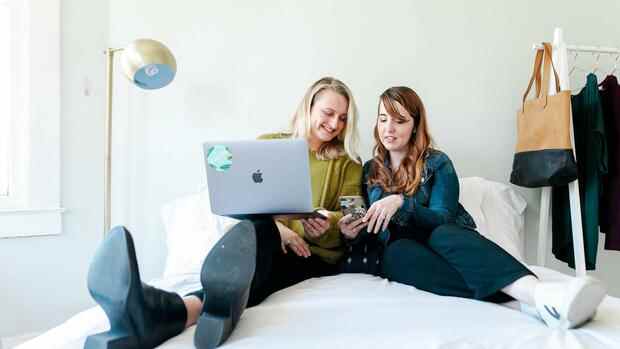new York Brightly.eco is the story of two young women looking for a meaningful business without being afraid of money. Laura Alexander Wittig and Liza Moiseeva jointly run the start-up Brightly.eco, which encourages a sustainable lifestyle and sells suitable products – and has received one million dollars in venture capital this year.
The two are part of a growing number of so-called “social entrepreneurs” – entrepreneurs who are not only profit-oriented, but for whom the social contribution they make with their company is in the foreground.
Laura Alexander Wittig actually comes from a direction that is not considered particularly sustainable: Her career began at Amazon Fashion. Right after college, she had to sell “as many shoes and handbags as possible” for her Amazon job, as she says in a podcast. Often these products were not just badly processed. They also came from dubious supply chains and were full of harmful chemicals.
Wittig was so good at it that, according to her own account, she generated many millions of dollars per week in additional sales for Amazon with her emails and social media initiatives. “From a professional point of view, I loved that I was so successful,” she sums up today. “But at the same time I asked myself what influence I have on this harmful circle of fast fashion”.
Top jobs of the day
Find the best jobs now and
be notified by email.
Her work was also in stark contrast to how she lived privately. As a consumer, she and her husband have rather experimented with as little clothing as possible and a minimalist home. In her job, on the other hand, she made sure that people buy even more things that they don’t need and thus harm other people and the planet. She had doubts and changed companies.
After ten podcast episodes already in the Apple charts
Further positions followed with famous names such as Google, Sephora and Adobe. As a social impact expert at Google, she helped to ensure that people were provided faster with contacts to relevant hotlines based on their online searches – for victims of violence or those at risk of suicide, for example. This work was far more fulfilling for her. But as with her other jobs, entrepreneurship appealed to her.
Wittig came across the slow fashion movement on Instagram and got to know her current business partner Liza Moiseeva. The native Russian already had her own start-up “Globeln” for sustainable and, above all, fair trade products – from handmade cups from Tunisia to drinking glasses from Mexico – and had a turnover of twelve million US dollars.
The two got along so well that they started their own podcast with “Good together”. This was aimed at people who are interested in sustainable living, but who do not necessarily become vegans from one day to the next and want to forego all the luxuries of consumer society.
The podcast was not only dedicated to individual products, but also to questions such as: How sustainable is the Superbowl? After just ten episodes, “Good Together” made it into the top 150 podcasts on Apple, a great success. It was the many encouraging responses from the audience that encouraged them to make more of the podcast – a platform for sustainability.
Wittig contributed her tech know-how that she had gathered at Google, Amazon and Adobe. Moiseeva contributed her experience as a founder with her own e-commerce company. She is primarily responsible for marketing and sales for Brightly.
Business instead of charity
Both women are united by the conviction that people don’t need any more charity, but companies that offer decent, fairly paid jobs worldwide and products that won’t destroy the planet. Their role models include Muhammad Yunus with his microcredits from the Grameen Bank and the founders of the outdoor brand Patagonia, who donate one percent of their sales to environmental organizations.
With their website Brightly.eco, the two of them not only give tips for a more sustainable life. They also review brands and products and make recommendations for them. These brands can also book advertising, but they don’t have to.
Moiseeva blames the community above all for her success, which she first created with the podcast and later with the website: “It is important to build a community and not just to sell things.” Today it is no longer enough to offer products pretending to be fair trade or sustainable. “A lot of people say that. That is why it is so important to check carefully whether products are really ethical. “
“But we still have to compare ourselves with the big ones, where our customers also shop,” says Moiseeva. The two women also want to grow. They brought out their own line of gifts for the holidays: from cooking aprons to elegantly designed compost bins.
The two make one thing clear: “We refuse to participate in any form of greenwashing.” This also applies when major brands propose partnerships. Many well-known brands are now looking to be close to Brightly. “H&M approached us about their Conscious Collection,” reports Alexander. This is a special line from H&M that places more emphasis on sustainability. But that was too tricky for women.
It is good if large companies also discover their green conscience. But they don’t think much of individual initiatives or large donations that are separate from the rest. “When corporations first pollute and then donate, I ask myself: Why don’t you do it right from the start,” asks Moiseeva. You and your business partner want to get it right right away.
More: More expensive, greener, more digital: This is how the business with everyday goods is developing
